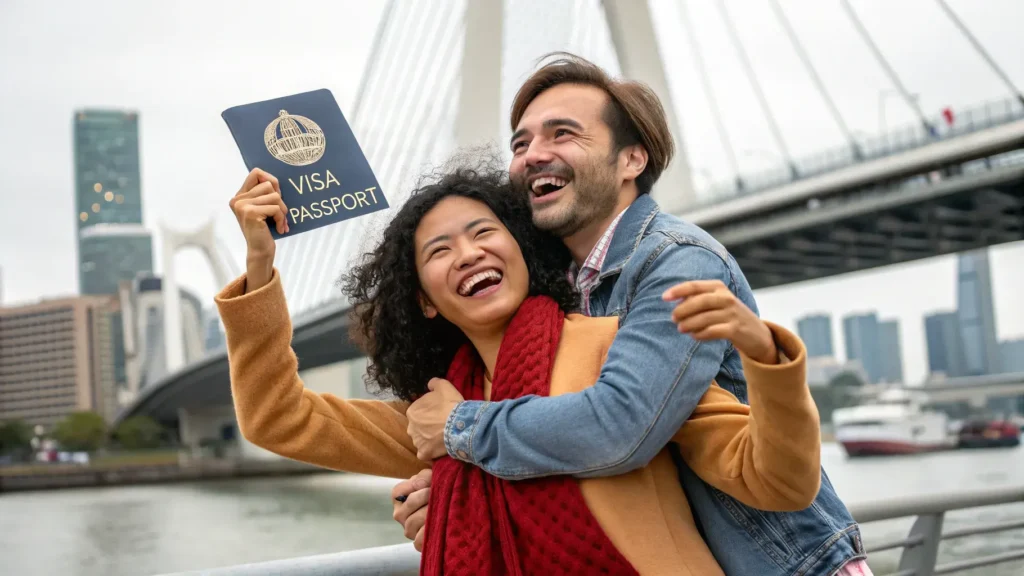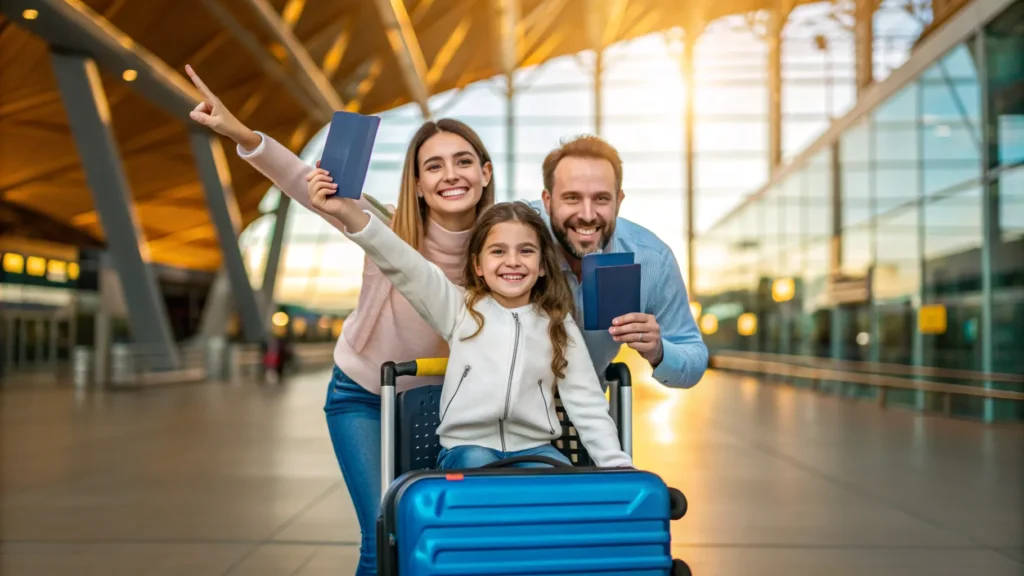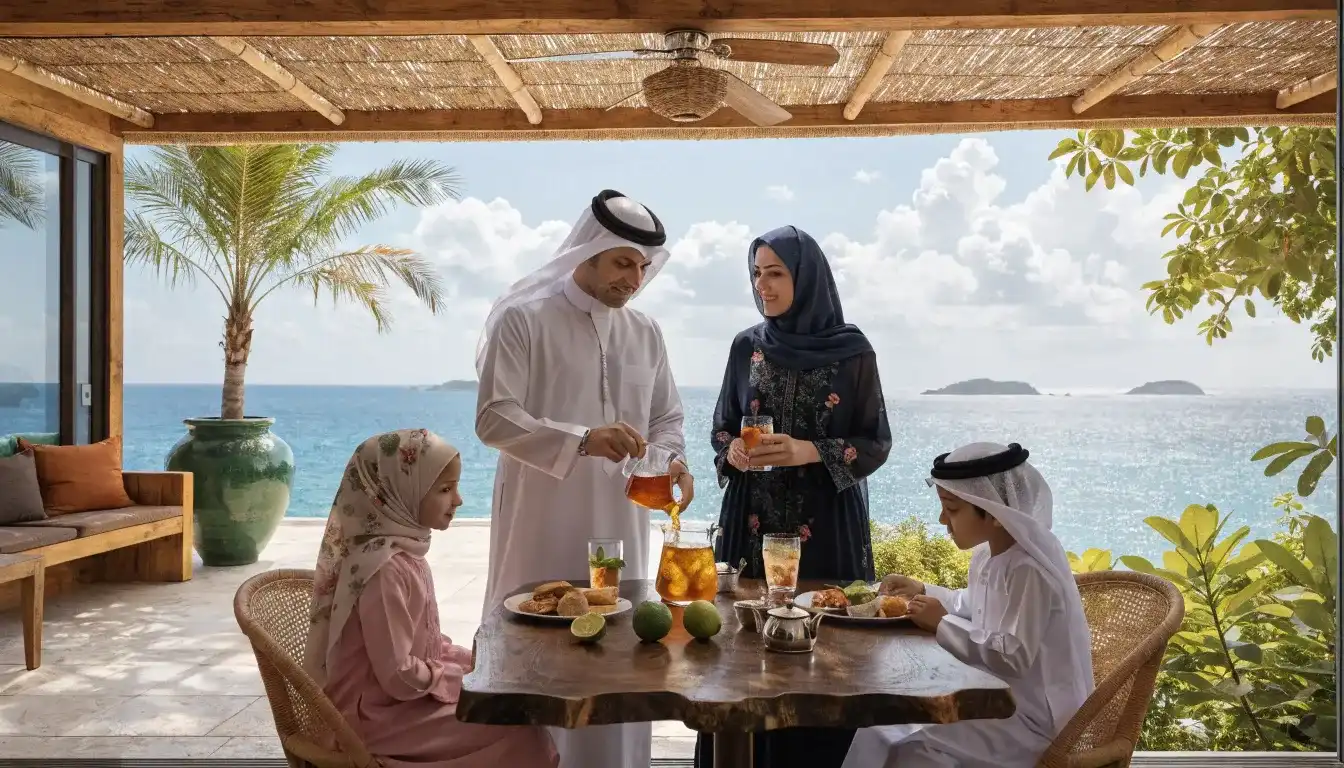Indonesia Dependent Visa: A Guide to Living with Your Family
oktarina
October 17, 2025
14 min read

Living in Indonesia with your family is a dream for many expatriates who are already working or residing here. The Indonesian government offers a special residence permit called the Indonesia Dependent Visa. This visa allows you to bring your spouse and children to live legally in Indonesia. As long as you hold a valid residence permit like KITAS or KITAP. With an Indonesia Dependent Visa, you can ensure that your family stays with you legally and comfortably.
The dependent visa offers peace of mind because your family can live together. Without the need to repeatedly enter and exit the country with short-term visitor visas. This article will explain in detail who can apply for this visa, the documents required, and the steps for processing it. Read on to learn the easiest way to apply for an Indonesia Dependent Visa and live together with your family in Indonesia!
What Is an Indonesia Dependent Visa?
The Indonesia Dependent Visa is a residence permit granted to the immediate family members of a foreigner who already holds a primary residence permit in Indonesia. Such as the primary KITAS (Limited Stay Permit) or KITAP (Permanent Stay Permit). The dependent visa is directly linked to the primary KITAS held by the main visa holder. Through this visa, you can bring your spouse and children to live together legally while the sponsor’s primary permit remains valid.
To obtain a dependent visa, applicants must meet specific eligibility criteria. Including proof of family relationship, sponsorship by the primary KITAS holder, and compliance with Indonesian immigration regulations.
This visa allows families to stay together without the need to leave Indonesia frequently on a short-term visitor visa. Foreigners holding a primary KITAS can sponsor their family members under this visa. So you no longer have to worry about renewing a visitor visa every few months. With a dependent visa, your family can stay longer and enjoy living in Indonesia peacefully.
Unlike work visas, holders of the Indonesia Dependent Visa are not permitted to work or conduct business. However, they are still free to engage in normal activities like attending school, participating in social activities, or simply managing the household. So, even though they can’t work, your family can still lead an active and fulfilling life in Indonesia.
The main purpose of this visa is to ensure that families can stay together and have legal security while living in Indonesia. If you’re already working or investing here, having a dependent visa for your spouse and children will be extremely helpful in building a stable and harmonious family life.
Who Can Apply for an Indonesia Dependent Visa?

The Indonesia Dependent Visa is meant for immediate family members, including the foreigner’s spouse and children, who want to live with the holder of a valid primary residence permit in Indonesia. So, if you are working, investing, or residing in Indonesia with a legal residence permit like KITAS or KITAP, you can bring your family members, such as your spouse and children, to live legally with you through this visa. Here are the family categories that can apply for the dependent visa:
- Spouse (husband or wife) of a holder of KITAS or KITAP. For example, if you work in Indonesia with a work or investment permit, your foreigner’s spouse can live with you using this dependent visa.
- Children (biological or legally adopted) of the holder of KITAS or KITAP, provided they are under 18 years old and unmarried.
- Indonesian citizens (WNI) who are married to foreigners (WNA). In this case, the Indonesian spouse can be the sponsor for the dependent visa for their foreigner’s spouse.
- Children from mixed marriages that have been officially registered in the Indonesian civil registry.
Foreigners residing in Indonesia can obtain a dependent visa for their eligible family members, ensuring they can stay together legally.
In each application, the sponsor of the dependent visa is the holder of the primary residence permit. That means if you hold KITAS or KITAP, you will be responsible for sponsoring your spouse or child while they live in Indonesia.
This visa is designed so families can stay together without being separated. By obtaining the dependent visa, you can ensure your spouse and children have legal residence, making family life in Indonesia more comfortable and peaceful.
Read more: Sponsorship Letter for Indonesia Visa: Complete Guide 2025
Types of Indonesia Dependent Visas

The Indonesian government offers various types of Indonesia Dependent Visas to suit your family’s needs. Each visa type has different purposes and validity periods, depending on the family relationship and the sponsor’s residence status. An Investor KITAS is also a type of primary KITAS that can sponsor dependent visas, allowing foreign investors and entrepreneurs to bring their family members to Indonesia. Here’s a breakdown of the different visa types:
1. Family Reunion Visa (E31B)
This is the most common visa for spouses of Indonesian nationals or foreign nationals who already hold KITAS or KITAP. If you’re married to an Indonesian or hold a work or investment visa in Indonesia, your spouse can stay with you using this visa. The Directorate General of Immigration is responsible for approving Family Reunion Visa applications, ensuring all submitted documents meet the requirements. The E31B visa typically lasts for one year and can be renewed annually. Some categories even allow direct applications for a longer-term visa.
2. Visa for Children of Indonesian or Foreign Nationals
This visa is for children who have either Indonesian or foreign parents holding KITAS or KITAP. If you live in Indonesia with your family and have children under 18 years old, you can apply for this visa for them. The required documents for this visa include the child’s birth certificate and the passport’s main identification page. The visa typically lasts for one to two years and can be extended as needed.
3. Visa for Parents or Siblings of Foreign Nationals Holding KITAS/KITAP
This type of visa is for those who wish to bring their parents or siblings to live with them in Indonesia for a specific period. While less common than visas for spouses or children, this visa allows extended family members to join the primary residence permit holder. Parents or siblings may initially enter Indonesia on a single visit visa before converting it into a dependent KITAS.
4. KITAS for Foreign National Spouse
If your foreign spouse holds KITAS or KITAP, you can apply for a KITAS so they can live with you. The KITAS for a foreign national spouse can be obtained after submitting the required documents and meeting the eligibility criteria. This visa is valid for one year and can be renewed annually. It doesn’t allow the holder to work but provides legal residency in Indonesia.
5. KITAS for Foreign National Children
This visa is granted to children of KITAS or KITAP holders who are under 18 and unmarried. To qualify for the visa, the child’s passport must have a minimum validity period, typically at least 12 months, at the time of application. The purpose is to allow children to stay and attend school legally in Indonesia without needing a short-term visitor visa.
6. KITAP for Family Reunion
For those who have lived in Indonesia for a long time and meet certain criteria, KITAP (Permanent Stay Permit) can be applied for. This visa is long-term, valid for five years, and can be renewed indefinitely. KITAP offers more comfort as you won’t need to renew your visa every year. If the marriage ends in divorce during the KITAP period, a divorce certificate may be required to update or terminate the KITAP status.
Document Requirements for Indonesia Dependent Visa
Before applying for the Indonesia Dependent Visa, make sure you have all the necessary documents in order. Missing or improperly translated documents can delay the approval process. To avoid issues, prepare everything ahead of time. Depending on your location, documents can be submitted online, at the Indonesian embassy, or at the local Indonesian immigration office. Here are the documents you’ll need:
- Passport with at least 12 months of validity
Ensure your passport is active for at least one year. If it’s close to expiring, renew it before applying. - Sponsor letter from the KITAS/KITAP holder or Indonesian spouse
This letter confirms the sponsor’s responsibility during your stay in Indonesia. - Marriage certificate or birth certificate for children
If these documents were issued abroad, they must be translated into Bahasa Indonesia by a sworn translator and legalized. - Proof of financial funds
Immigration typically requires a balance of about USD 1,500–2,000 to show financial capability during your stay in Indonesia. - Declaration of no employment
This document states that you will not work or engage in business during the dependent visa’s validity period. - Two passport photos with red background copy
You must provide two recent passport photos with a red background. These are required for identity verification and compliance with immigration regulations. - Visa stamp
Include a copy of your visa stamp as proof of entry or previous visas. - Approval letter
An approval letter from immigration authorities is required to facilitate the visa issuance process. - e-Visa form
Fill this out carefully, matching the details on your passport. Small errors like incorrect spelling of names or birth dates can delay the process.
How to Apply for an Indonesia Dependent Visa

The process of applying for an Indonesia Dependent Visa is now fully online, so you don’t need to go directly to the immigration office to start. As long as you have the correct documents and follow the steps in order, obtaining the dependent visa is quite simple and efficient. Here are the steps:
- Apply for e-Visa
The sponsor (the person holding a KITAS/KITAP) applies through the official site evisa.imigrasi.go.id. Upload all necessary documents such as your passport, sponsor letter, and marriage or birth certificates in digital format. Make sure the files are in the correct format to avoid rejection. - Verification and Payment
After the documents are checked, Jakarta’s Directorate General of Immigration will review the application. If approved, the sponsor will receive a bill for the visa fee. Payment can be made online via debit card, credit card, or bank transfer. After payment, the DGI decides on the approval and issues the approval letter. - Issuance of e-Visa
Once the payment is confirmed, the e-Visa will be sent to the sponsor’s email. This document serves as the entry permit to Indonesia, so make sure to keep it in both digital and printed formats. - Arrival in Indonesia
Upon arrival, bring the original documents such as your passport, e-Visa, and sponsor letter. The e-Visa allows you to enter Indonesia legally. Immigration officers will verify everything before granting entry. - Process at Immigration Office
After arriving, you need to visit the local immigration office for a photo, fingerprinting, and a short interview. This is required to officially register your details in the immigration system. - Issuance of e-KITAS
Once the process is completed and your application is approved, you will receive your new status as an e-KITAS Dependent visa holder, a digital stay permit that will be valid according to the sponsor’s KITAS.
How Long is the Indonesia Dependent Visa Valid?
The validity of the Indonesia Dependent Visa depends on the type of stay permit held by the sponsor. Make sure the sponsor’s visa remains active to keep the dependent visa valid. Here’s an explanation:
- If the sponsor holds a KITAS
The dependent visa will be valid for one year, matching the KITAS validity. After this, you can renew the dependent visa along with the sponsor’s KITAS. - If the sponsor holds a KITAP
The dependent visa can be valid for up to 5 years, matching the KITAP’s validity. This type of visa is suitable for long-term stays in Indonesia with your family. - General validity
The dependent visa cannot last longer than the sponsor’s permit. If the sponsor changes their status, stops working, or doesn’t renew their stay permit, the dependent visa will automatically expire.
How to Extend or Change the Status of Your Dependent Visa
You can extend your Indonesia Dependent Visa by applying at the immigration office before it expires. This is important to keep your residence status valid and avoid overstaying penalties.
- Extension Process
Apply for an extension at least 30 days before your visa expires. You will need to submit your documents, undergo photo and fingerprinting, and possibly attend a brief interview. The process usually takes 5–10 working days, depending on the volume of applications. - Documents Needed
- The latest sponsor letter
- Copies of the sponsor’s KITAS/KITAP
- Proof of payment for the extension fee
- Changing to Work Visa (KITAS Kerja)
If you wish to work in Indonesia, you need to change your dependent visa status to a work visa. Holding a dependent KITAS does not allow you to take up a full-time job; a separate work permit (IMTA) is required to work legally. The company employing you will handle the application and obtain the necessary work permit and a new KITAS. If you change jobs, your new employer must sponsor your work permit and KITAS. - Changing to KITAP (Permanent Stay Permit)
If you are married to an Indonesian citizen and have lived in Indonesia for at least two years, you can apply to change your status to KITAP, which provides permanent residency and can be renewed every 5 years.
Tips for a Smooth Indonesia Dependent Visa Application

To ensure your application goes smoothly and quickly, consider these practical tips:
- Prepare documents early
Make sure all documents are ready, including your passport, sponsor letter, and marriage or birth certificates. Don’t wait until the last minute. - Double-check all required documents
Before submission, carefully review and ensure you have all required documents as specified by Indonesian immigration. Missing paperwork can delay your application. - Use a certified translator
Documents from abroad must be translated into Indonesian by a certified translator in Bali to be accepted by immigration. - Check passport validity
Ensure your passport is valid for at least 12 months before applying. If it’s close to expiration, renew it first. - Use an active sponsor
Make sure your sponsor’s visa is valid and they’re still in good standing with immigration. - Ensure compliance with Indonesian immigration regulations
Familiarize yourself with the latest Indonesian immigration requirements and procedures to avoid issues during your application process. - Save digital and physical copies of documents
Keep digital and printed copies of your important documents, including the e-Visa, sponsor letter, and proof of payment. - Consider professional services
If you want to avoid the hassle, consider using a visa concierge service. Our team is experienced in assisting expatriates and their families with visa applications, document legalization, and fast, safe extensions.
Read more: The Difference Between Kitas and Kitap You Must Know Before Applying!
Apply for Your Visa with Ease and No Hassles with Bali Premium Trip!
The Indonesia Dependent Visa allows your spouse and children to live together with you legally in Indonesia, as long as the sponsor’s permit is still valid. It ensures that your family can live with you peacefully, without concerns about immigration paperwork. However, applying for a dependent visa can feel complicated if you don’t follow the right procedures. That’s where Bali Premium Trip comes in.
With our professional visa concierge services, we ensure all your documents are complete and properly verified, helping speed up the process. Our experienced team will guide you through every step, from document preparation to visa extension, so you and your family can focus on enjoying your life in Indonesia without any immigration hassles.
Don’t let the visa application process be a burden. Contact us now to start your application and get the best service from Bali Premium Trip!

Related Article
A Discreet 48-Hour Private Relocation from the Gulf to Bali
Bali, with its stunning natural beauty, rich culture, relaxed lifestyle,...
Bali, with its stunning natural beauty, rich culture, relaxed lifestyle, and safety, is becoming an increasingly popular choice for those...
Relocation from Dubai to Bali: The Ultimate Family Guide to Move Securely and Comfortably
Recent operational disruptions announced by Dubai Airports include suspension at...
Recent operational disruptions announced by Dubai Airports include suspension at Dubai International Airport (DXB) and Al Maktoum International Airport (DWC)....
The Ultimate Bali to Komodo Island Private Superyacht Charter: An Elite Concierge Guide
BALI, INDONESIA — At Bali Premium Trip, our high-end concierge...
BALI, INDONESIA — At Bali Premium Trip, our high-end concierge desk caters to the most exclusive travel requests across the...



